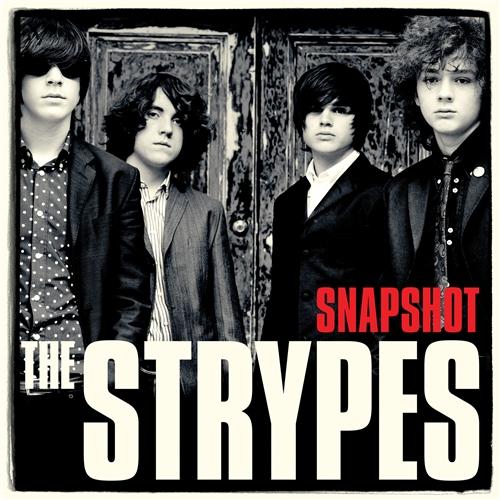
The Strypes
Snapshot
(Photo Finish/Island)
Videos by American Songwriter
Just when it seemed hope was lost, and that not only was nobody making essential rock and roll, but nobody seemed to even remember why. Why rock and roll? Why not, I don’t know – country swing? Or Big Band Jazz? Well, because only rock can really do what rock can really do, and the Strypes know how to rock. Authentically. This is the real, essential stuff, the rock of rockers, the rock of those who know the blues thoroughly. So thoroughly that they can emerge from the blues organically, just the same way rock and roll did, turning up the amps, revving up the tempo, breaking up the beat with fat snare backbeats, locking that bass drum in with the elemental pulse of the electric bass, and charging forward, like a locomotive, inhabiting every song with color and character and blood, and all in under three minutes, before it’s time to count down the next one. This is a statement of rock and roll purity, all great songs mixed in with hidden treasures of the fiery blues exploding into rock and roll. Pure gregarious greatness. It’s all there in the beautiful purity of the opener, the great “Mystery Man” which bursts out of the gate like a bronco, all compelling riff and classic snare groove. It’s a lesson in great rock and roll, fast riff, bluesy melody, skipping backbeat groove, perfect set –up to the title, even a fast harmonica solo by Ross. Nothing faked, this is the real deal. “Blue Collar Jane” even spells out the name of his obsession, ala “Gloria” – and like early Beatles, it’s attitude with great tunefulness and perfectly matched harmony. It’s four: Ross Farrelly on lead vocals, harmonics and percussion. Sometimes, like Jagger, he’ll play guitar. But he’s the lead man. Josh McClorey plays lead guitar and covers those back-up harmonies. He’s a fine and burning guitar player, whose fast leads never fail to ignite. Pete O’Hanlon is on bass, and Even Walsh plays drums. They all write the songs together, although sometimes one Strype writes most of it, and gets individual writing credit – such as on “Blue Collar Jam,” written by McClorey with the band. Like the Stones did in their baby days, The Strypes mix up their new classics with incendiary versions of old blues such as the Dr. Feelgood classic “I Can Tell” and Willie Dixon’s “You Can’t Judge A Book By Its Cover.”
The whole albums sings like a poem, like one long epic inspiration, connected, and deserves to be listened to one song after the next, just like we used to listen to albums. There’s momentum here, and each songs dances directly into the next with a sense of rightness, not to be disturbed. It drives like a car with no brakes all the way to a primal reading of Nick Lowe’s “Heart of the City,” which then opens the door to a combustible, metallic take on the Muddy Waters classic, “Rollin’ and Tumblin’” but replacing the old words of whiskey and religion with new words about a very young, silver-tongued angel. If you were not already a believer, this is the one that will convert you. This is your invitation to get on this Strypes train when it comes to your town. If you don’t, it’s sure to speed on by without you. But if you want to revel in the genuine, unmistakable power of real rock and roll – that element force which exploded out of the raw Chicago blues to rock the planet – go Strypes.
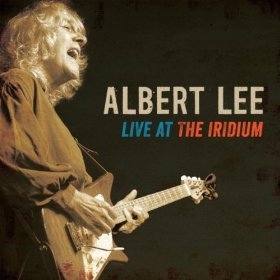
Albert Lee
Live at the Iridium
For devoted fans of Mr. Lee, of which I am one, this is a bundle of joy, a great live album of Albert singing and playing with the band, and a beautifully shot DVD of the proceedings. Seeing Albert as well as hearing him is always fun, because he plays with such graceful ease, it’s a joy to behold, as he rips off these astounding guitar lines with the calm of the Buddha. Here he sings a chain of beautiful songs – from the great “Evangelina” through two essential train songs, “Luxury Liner” and “Runaway Train” to a breathtaking “Highwayman” and more till he tore it up in “Tear It Up.” Man. The man gives all, and then some. He’s a gifted, sensitive singer, and an astounding guitarist. And here with his band, he is in his element: JT Thomas on keyboards, Lou Castro on bass and Jason Harrison Smith on drums. This has everything great about Albert Lee, and that’s a lot. His spirit is a joyful one, and that joy imbues every beat.

Claudia Schmidt
New Whirled Order
(Redhouse Records)
A perfect arrival for the happy start of Spring, a new album by an old friend, a heroine in my native Chicago, the great Claudia Schmidt. Those of us who remember well the heyday of the Chicago folk scene back in the 70s, when Steve Goodman and John Prine were leading a great parade of songwriters that also included the legendary Bob Gibson, Michael Smith, Bonnie Koloc, Fred & Ed Holstein, Jim Post and others. And in that midst was Claudia Schmidt – a tiny woman with a giant voice, and a heart and spirit so expansive that anyone who heard her sing got drawn into that soulful vortex, and was a lifelong fan. And though I didn’t bother to calculate it back then, she must have been way younger than these other folks. But she took her place besides Gibson and other vets like she belonged there, and, of course, she did.
She played mountain dulcimer and 12-string guitar then, and still does, and whether singing an old folk song, or a Pete Seeger gem like “Old Devil Time” (her rendition of which is transcendent) – she would entrance us with her infectious spirit, her gleaming eyes, and her deep-pocket soul. Now comes a brand-new album by Claudia. And this is the perfect time for new music from her. This is music of extremes – of great joy and deep sorrow, or bravery and fear, or humor and resignation, and more. Great musicianship abounds throughout, acoustic dimensions as warm as her voice is sweet and strong. Produced by Claudia with Dean Magraw and Mark Thayer, it’s a compelling collection all of originals. It starts with the exultant “Already,” which is a great starting place, triggered by the conceit of “I already know I love you,” allowing the singer to spring beyond unnecessary exposition to get right to the heart of the thing, which is the heart. “Sea of Forgiveness” is a haunting elegy, reminiscent of early Joni Mitchell, punctuated by poignant oboe, and painted with pointed, foreboding language: “And buzzards pierce the coming dark like swords across the moon.” She deflates the heroic role of the singer in “Nothing,” in which she details all the thing she’s not, and unapologetically presents herself as “just a girl in my pajamas with a lovely book to read.” Powerful, unique lyrics remind us of all the places still to go in songs that nobody’s gone, and all the pictures to show. To a bluesy vibe, she winks at us in the shadows of “My Defenses Are Down,” with “I wake up alone, I got to bed alone/I’m a party of one, it’s quite well-known/So what’s this tug on my heart/this tingle to the bone/My defenses are down.” She pays tribute to her late mother in two closing songs, “Janes Gone,” and then a round of voices on “Jane’s A-Round” that shows us the songs are alive, being sung in rounds forever and always. There’s so much here; I have listened over and over and each time there are new revelations, new beautiful turns of melody and chords, unexpected lyrics, whimsy and sorrow entwined. It’s good to have her back. Claudia Schmidt is a beloved musical treasure.
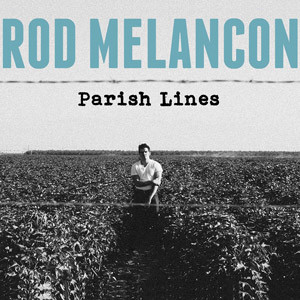
Rod Melancon
Parish Lines
(Medina River)
Rich poignant songs of the Heartland, Americana ballads and rockers primed to make you dance or cry, and sometimes both. The man is a story teller, and whether those stories are late night, coal-mine dark or Saturday sunny summertime barn dance bright, he delivers them with true authority. He’s got a voice keen as a laser beam, but with deep, earthy soul. He paints beautiful and dark stories, like the great “Duck Festival Queen” which tells a heartland American story, echoing dark Nebraska-era Springsteen. Like The Boss, he is capable of rocking out into classic rock and roll, like “Mad Talkin’ Man,” but also very touching in dark ballads, like the beautiful “Curve Lounge.” “Dreamer” is a waltz-time reverie that resounds like a lost John Prine classic, while “Cushing Avenue” is a rock rave-up, anthemic and essential, ideal for blasting from a convertible while cruising. Produced by Brian Whelan, Parish Lines has the sound of a new classic. It’s modern but with a timeless sound and direction, a hybrid of much that is haunting and rocking both. “Feathers” wraps it up like a great lesson in picturesque story-telling narrative songwriting. This guy’s got a whole lot to share, and the talent to get it across. Hoping this is one in a long line of rich offerings to come.
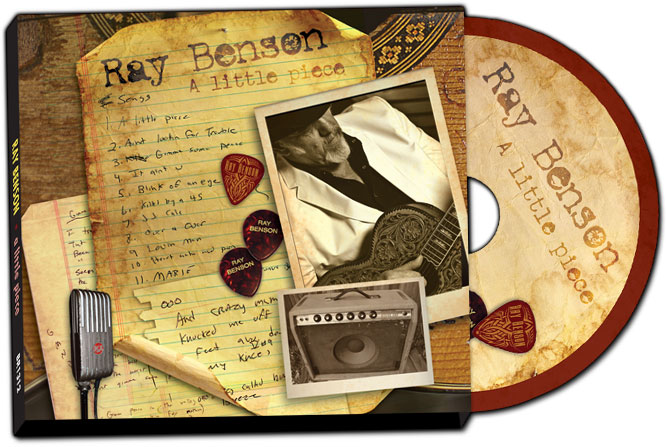
Ray Benson
A Little Piece
(Bismeaux Records)
Beautiful and inspirational. He’s the famous voice, and the soul, of Asleep at the Wheel. Ray Benson, a big man with a big, deep voice, a voice as rich as the earth. With his band he’s famous for fast western swings and bluesy boogie woogie, and he’s a master at that. But he also has a softer side – he can sing a ballad with so much heart it’ll make you cry. Listen to the title song, here, “A Little Piece,” with a melody as sweet as a lullaby, sung with such tenderness and sweetness. It’s an essential song, a classic ballad of humans needing human, etched in poignant, haunting pedal-steel . If this song isn’t a standard already, it should be. “Give Me Some Peace” is a prayer for calm and clarity, and for a spiritual respite. He duets with his old pal Willie Nelson on Waylon Jennings’ “It Ain’t You,” and the sound of these two resonant voices together is heartwarming. Ray and Willie share a similar vocal style – a very smooth, resonant voice phrased just after the beat, like Bing Crosby used to – this one pulls on the heartstrings. “JJ Cale” is a sly and simmering tribute to Mr. Cale, a song informed and intimate, and with a delectable groove ideal for a great electric guitar solo by Ray, summoning up the spirit of his old friend. He wraps it all up not with one of his own song, but one of Randy Newman’s – the stunning “Marie.” Though it’s a piano song, Ray translates it beautifully to acoustic guitar, and then sings it like he’s sung it every night for decades, just voice and guitar. Beautiful. A wonderful and nourishing collection of songs by an American treasure. A keeper for sure.
Yes. This is delightful in many directions at once. Bandit Soup is the creation of songwriter Bill Bothwell, who has a soulful, quirky distinctive voice that is perfect for songs both soulful and quirky. He’s a guy who isn’t about to be tied down, and is at once a lyrical balladeer, and then very Dylan-connected folk rocker, and then a turn towards the blues. Bluesy and breezy both at time, and deeply and darkly serious, it’s urgent and timeless at once, both classic and modern. Bothwell sings and sounds a lot like Bob Dylan a lot – but much more the haunted, later-day Dylan – and embraces rather than avoids the Dylan presence – most overtly in “West Bank Blues,” which searches for identity not in life but in the grave, and asks for liberation. He echoes the minor-key aching of “Blind Willie McTell” to invite fellow acolytes in the words of the man himself: “One more cup of coffee please/and I could go anywhere.” Throughout all these songs is the unexpected: unexpected passages of poignant melodicism, as in “Leaves Are Falling No. 3,” which sounds like the unlikely collaboration of Bob Dylan and George Gershwin, and with the delicate American romanticism of “We took our hands off the handlebars/Saw kisses falling from the weeping stars.” Produced lovingly by Joel Wachbrit, it features the dynamic drumming of the great John Molo, as well JT Thomas on keyboards and accordions and Steve Nelson on bass. The one song I keep coming back to is “Everything Must Go,” which resounds remarkably like a brand new rock classic. With the raw urgency of Neil Young with Crazy Horse, it comes from that place where folk and elemental rock and gospel intersect to sing straight from the heart, essential and pure. It soars. Great anthemic choir chorus and Molo’s soulful groove wed to this explosive electric guitar lead, it’s one of those songs that could go on and on without end, like “Like A Hurricane” at is most wild, and be right. And then comes the hushed and dimensional “Just Like The Moon,” a lovely and lyrical melodic excursion which is like Dylan singing a lost Cole Porter song in Paris, with candlelight, a bottle of red wine, and that old accordion reverberating down the brick alleyway like a ghost. There’s more equations here in Bandit Soup than most people can hold in their head at one time, which is good, because most albums have less. This is rich and dimensional stuff, great songs by a fine songwriter , beautiful produced and performed throughout. In these days of download and run, this is one of those rare albums that you want to listen to, over and over, from beginning to end, just like we used to when music was everything and more.

Andy & Renee
KELP!
(Styrofoam)
Anytime that Andy Hill and Renee Safier make music together, it sounds great – whether it’s on one of their originals, or in one of a thousand Bob Dylan songs they do so beautifully in their annual Dylan festivals. This collection of songs are ones they have done live for years, according to their liner notes, but never recorded. “We have had a difficult time,” they wrote, “finding the courage to include them on collections in the past. We thought it best to make you suffer through them all at once.” So we get some very funny songs, including “Free Bird,” which isn’t that “Free Bird” but is a tribute of sorts to that song, remarkably. Songs written by Andy alone and also by Andy and Renee together, even when they’re joking, the thing is, it sounds great. Like when Dylan and The Band made up funny songs in the basement just to have fun and to make music, there is an infectious joy in these tracks like those ones – and also great musicianship throughout. This is produced by Andy and Renee with their good friend, the great Marty Rifkin, who plays astounding pedal steel – but also a lot of bass here – and with fine drumming by the always great John Hoke. So there’s not really a lot of suffering required when listening to this – this is a lot of fun – like a great show, with wonderful duets throughout. “A Habit That’s Goin’ Around” is especially delicious, with great rhymes that would have made Sammy Cahn proud: “He’s a slippery snake/an anaconda/On the make he’s fond of the double entendre…” You can tell all the involved had a lot of fun making this, and that fun comes across in each of these tracks. If you’re in the mood for a party with some fun and funny people – and one hell of a great band – put on Yelp.

Suzanne Vega
Suzanne Vega Live
(Solitude Standing) (A DVD)
A delightful concert filmed in Rome in 2000 for a reverent audience, who are sweetly spellbound by her songs and stories and even some poems, translated into Italian right there by singer/songwriter Valerio Piccolo. She’s in great form, gently performing her beautiful songs to her own spirited acoustic guitar accompaniment and the excellent Mike Visceglia on electric bass. This is a pure performance, a tenderly sensitive projection of her lyrical songs, which stand beautifully and proudly in the stark simplicity of the presentation. When words and music work so fully, as in her songs, it feels right to deliver them so directly. “Left of Center” comes to life with just voice and percolating bass, dynamic with distinctive phrasing and elusive melodics, which play at the edges of minor keys. It’s a song about not being predictable, and like “Small Blue Thing” and “Marlene” is a song about what’s not there, what we bring to the world with our perceptions. It doesn’t grab you by the collar and insist you listen; quite the opposite. It says that if you want to listen, I will be here singing. Many of her most famous songs are here, such as the great “Marlene On The Wall,” which opens the show, as well as “Small Blue Thing,” “Luka” and “Tom’s Diner.” “Penitent” is especially powerful in its hushed descriptions, especially after an introduction about penitence, and a reflective, dynamic reading. “Caramel” resounds mysteriously and beautifully, and comes alive in this acoustic setting in a beautiful way. “Solitaire” is a beautiful and rhythmic exploration of the way modern technology separates us from life, and is especially poignant, given its collective reception at this invention of previous centuries – the concert – when the performer meets an immense audience directly, and has even flown across the ocean to be physically present just like in times gone by, before technology connected us in non-physical ways. “Luka” comes across with great power and beauty, remaining not only one of her most brilliant lyrics – again, a song about what is not being said, and in this instance, what can’t be said – and maybe her most singable and agreeable tune. There’s also a thoughtful conversation between Piccolo and Vega on poetics and life. Good stuff.
Donna Lynn Caskey
Nameless Heart
I heard her sing and play her banjo a few years ago, in the midst of so many musicians and songwriters playing their songs, and I never could forget her music. Simple and stark against beautiful driving rhythms and delicate passages of her fine 5-string banjo, her songs resound like modern spirituals. She writes and plays beautiful songs of enduring hope along the ways of being human. Her voice and words and banjo all seem entwined, so that her songs seem intrinsic, unforced, and genuine. Her message is earthy and affirmative both, a beautiful connection between the world of nature and of man, and her acoustic textures reflect this natural connection. “Who Will Care?” is a song of great specifics, and as such is universal, with the eternal open question of our own destinies, forever on a road on which we can’t see to the end till we get there. But in the meanwhile, we should sing and dance and rejoice in the natural music which lives in our souls. And the answer is “everything is possible, everything is possible,” which is a bright and good message to receive now when sometimes even extended survival seems impossible. This is delicate and dynamic music, unaffected, beautifully produced by Mark Hallman, full of spirit and calm focus. This is music that is good for the spirit – good for all that ails us – an acoustic antidote to chaos and overload. I hope this is the first of many. She’s very much the real deal.
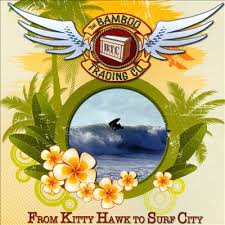
The Bamboo Trading Company
From Kittyhawk to Surf City
Vocal harmony heaven. Absolutely wonderful songs, songs about flying and taking journeys. But rendered in absolutely golden vocals. There are some famous singers here, and they got together, it seems, for the pure joy of making this kind of music. It’s the kind of music Jan & Dean would make – and not only is Dean Torrence singing here, so it Katie and Jillian Torrence – and many of the others met while performing with and on the same bill as Jan & Dean, such as Gary Griffin, Chris English, Randell Kirsch, Phillip Bardowell and Matt Jardine. The song “Airborne” both begins and ends the album, and is perfect in its sumptuous harmonic splendor at setting the stage. Produced by David Beard and Gary Griffin, this is a delight. Think Brian Wilson with all the Beach Boys and several Beatles too, and you get the idea. This is a joyful album. Seems like these guys had a lot of fun making this music, and that fun is infectious and in every track.














Leave a Reply
Only members can comment. Become a member. Already a member? Log in.